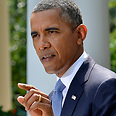
Wink on the way to a bomb
Op-ed: Washington's indecisiveness on Syria tells Israel its assurances regarding Iranian threat cannot be counted on
In the background of the debate regarding President Obama's conduct during the Syrian crisis lies a more critical question: How will the US act when Iran edges toward a bomb? Can we count on the White House's decisive statement assuring us that Iran will not obtain nuclear weapons? The period at the end of this firm statement is suspiciously similar to the red line Obama set for Syria just a year ago.
The evidence that will show Iran is close to a nuclear bomb will be similar to the evidence indicating that the Assad regime poisoned hundreds of its citizens. The evidence will be accompanied by a host of questions which will be logical, but their sole purpose will be to avoid a decision. The questions will deal with the conclusiveness or inconclusiveness of the evidence, the ruler with which the term "close to a bomb" will be measured and the intent and mental stability of Iran's leaders. The questions will also deal with the effectiveness of a military strike and how such a strike may affect the American economy and public opinion.
And when it turns out, beyond a reasonable doubt, that Iran is a step away from nuclear capability, will the US decide that an Iranian bomb endangers its security to the point where it must immediately launch an operation whose consequences are unclear, or will the US - after months of hesitation – decide that the world can carry on just fine with a nuclear Iran? Experts at the National Security Council and American research institutes may say that if we can live with a nuclear Pakistan and North Korea, we can also live with a nuclear Iran.
PM Netanyahu and several strategists who hold his opinion are losing sleep thinking about this possibility. They are certain that an Iranian bomb is an existential threat, not because Iran will rush to fire missiles with nuclear warheads at us, but because an Iran equipped with doomsday weapons will further encourage elements that will provoke us without the fear of a massive response, and also because other Mideast countries will develop nuclear weapons to deter the Shiite superpower. They also fear that these weapons may fall into the hands of terrorists from groups such as al-Qaeda .
If we doubt Washington's willingness to attack Iran when the moment of truth arrives, and if we are of the opinion that nuclear weapons in Iran's hands will undermine Israel's security to the point where its very existence will be threatened, then the conclusion is that Israel must attack, even if such an attack will only delay Iran's nuclear program and result in severe Iranian counter-strikes. I suppose the political-security establishment in Israel is considering this option much more seriously following what has been described as indecisiveness in America's policy. Many analysts will stress the differences between the decision the White House had to make with regards to Syria and the decision it will be faced with as Iran moves close to a nuclear bomb and say that there is no connection between the two, but no promise made by the White House can allay the concerns of Israel's leaders or make them less suspicious.
On the other hand, there will be those who will say that attacking would be a gamble Israel cannot afford in any way. So what will happen if we don't attack? The most likely scenario is the existence of a regime of nuclear deterrence and local wars in the Middle East. We must prepare for such a future.
- Receive Ynetnews updates directly to your desktop










